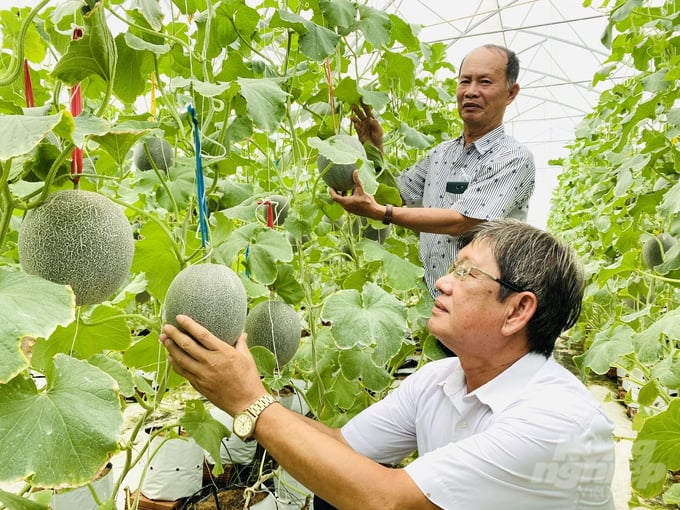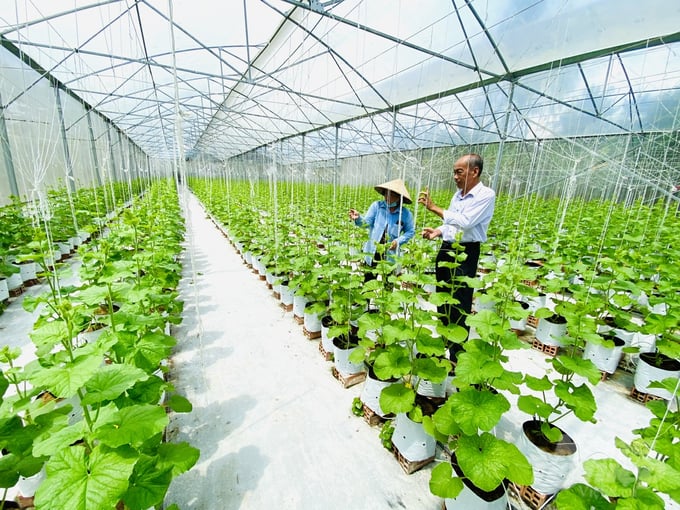November 19, 2025 | 08:11 GMT +7
November 19, 2025 | 08:11 GMT +7
Hotline: 0913.378.918
November 19, 2025 | 08:11 GMT +7
Hotline: 0913.378.918
The Department of Agriculture and Rural Development of Can Tho City recently held a seminar on the "Orientation for the development of high-tech agriculture in Can Tho City by 2030, with a vision for 2045".
Can Tho, as the economic and social center of the Mekong Delta region, is accelerating a strategy for the development of high-tech agriculture. The city boasts a total agricultural land area of over 114.168 hectares and its agricultural sector has played a crucial role in driving the local economy. Every year, Can Tho produces more than 1.3 million tons of rice, 200.000 tons of fruit, 220.000 tons of seafood and a wide variety of other agricultural products. Despite this, the city faces several challenges, including climate change, market competition and the ever-growing demand for higher quality products. As a result, transitioning to high-tech agriculture has become an essential step to maintain sustainable growth.

High-tech agricultural production in Can Tho City. Photo: Le Hoang Vu.
Mr. Nguyen Van Su, Director of the Department of Agriculture and Rural Development of Can Tho City, mentioned that Can Tho has natural advantages in terms of land, climate and human resources. However, to fully capitalize on these potentials, the city needs to guide agricultural development towards high-tech methods. This shift is necessary not only to enhance production efficiency but also to create sustainable added value in the long term. Especially in recent years, high-tech agricultural production in Can Tho has achieved several promising results.
Currently, 95% of the rice-growing area in the city uses high-quality rice varieties and the city has developed 48.000 hectares of low-emission rice cultivation. It is also participating in the One Million Hectare High-Quality Rice Project in the Mekong Delta region. Mechanization has been widely applied in all stages of rice farming, including sowing, tending and harvesting.
For safe vegetable production, more than 229 hectares are now being grown in net houses, where automatic sprinkler irrigation systems and hydroponic farming techniques are used. These areas supply nearly 28.400 tons of vegetables each year.
High-quality fruit production has also been promoted, with over 12,673 hectares of specialized fruit farms, some of which have been certified with planting area codes. These certified areas, totaling 2.848 hectares, are now able to export fruit to markets such as the United States, Japan and Australia.
The city is also home to 230 livestock farms, all of which follow biosecurity standards. These farms collectively produce more than 40.000 tons of meat annually.
Regarding aquaculture, Can Tho has an area of over 10.000 hectares dedicated to the industry, with an annual seafood output of 200.000 tons. Of this, 193 hectares are certified under VietGAP and ASC standards.
According to the development plan for Can Tho from 2021 to 2030, with a vision for 2045, the city will establish 7 high-tech agricultural zones and 2 concentrated livestock farming areas. These zones will serve as key centers for research and the production of high-quality plant and animal breeds, incorporating advanced technologies such as genetic engineering and biotechnology. They will also focus on building standardized production processes that meet international quality benchmarks.
In addition to these high-tech zones, the city is also committed to developing large-scale, concentrated production regions. The goal is to create comprehensive agricultural value chains that span the entire process, from crop cultivation and livestock farming to processing and distribution. By integrating these stages, Can Tho aims to strengthen the competitiveness of its agricultural products and improve market access.

By 2045, Can Tho city aims to become the high-tech agricultural hub of the Mekong Delta region. Photo: Le Hoang Vu.
The application of digital technology and automation is primarily focused on adopting modern management systems, smart production methods, reducing greenhouse gas emissions and ensuring environmental protection. Additionally, agricultural development is closely tied to tourism, with the goal of creating eco-tourism and experiential agricultural products based on the region's unique agricultural specialties. The main focus is to promote stronger linkages between businesses and cooperatives, with the aim of enhancing their roles in technology investment, knowledge transfer and the establishment of stable markets for agricultural products.
Mr. Le Minh Hung, Director of Western Green Agriculture Co., Ltd. (Thot Not District, Can Tho City), explained, "We have invested in state-of-the-art greenhouse systems and water-saving irrigation systems to produce safe vegetables and melons. These high-tech solutions help reduce production costs, boost yields and enable us to better meet the stringent requirements of export markets".
At the same time, Mr. Nguyen Van Binh, Director of the Viet Thang Agricultural Cooperative in Co Do District, shared, "By integrating technology into rice production, we have not only been able to reduce the use of fertilizers and pesticides but also significantly improve the quality of our rice, making it more competitive in international markets".
By 2045, Can Tho aims to become the high-tech agricultural center of the Mekong Delta region, with a smart, circular, and environmentally friendly agricultural system. Agricultural products from Can Tho will not only meet domestic market needs but will also establish a strong presence in international markets, reinforcing the city's position as a key player in global trade. High-tech agriculture is more than just a growing trend; it represents the foundation for Can Tho's sustainable development. At the same time, it will enable Can Tho to quickly adapt to climate change and emerge strongly in the context of an increasingly integrated global economy.
Translated by Phuong Linh

(VAN) SEIKI Group envisions itself as a pioneer in the ‘dual transformation’ of digital technology and green industry, standing alongside the Government and Vietnamese businesses in their pursuit of sustainable development.

(VAN) The VNGEONET network affirms Viet Nam's progress in mastering digital space, providing a precise positioning data platform to serve socioeconomic development.
/2025/11/14/3247-1-184556_35.jpg)
(VAN) Thai Nguyen is methodically implementing digital transformation in the livestock sector, laying the foundation for a modern, transparent, and sustainable agriculture.

(VAN) The year 2025 marks 80 years of development of the Agriculture and Environment sector, a proud journey with significant progress in production, integration and sustainable growth.

(VAN) De Heus continues to steadfastly pursue sustainable development, building linked value chains with farmers and businesses in Viet Nam.

(VAN) From the rich lands of Co Do (Can Tho), an enterprise is amplifying the value of the clean rice grain, a symbol of the vitality and pride of the Mekong Delta.

(VAN) The Vietnamese irrigation sector has undergone a remarkable transformation, becoming a proactive force in disaster prevention, climate adaptation, and risk management in the era of climate change.